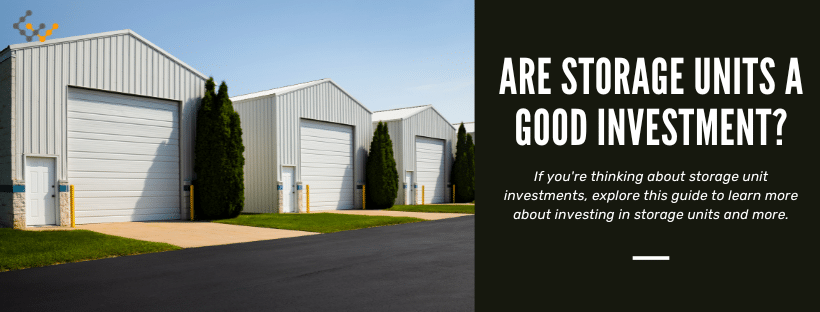Are Storage Units a Good Investment?

The investment in self-storage could be beneficial to some investors. With a wide range of potential storage facility opportunities in many areas, it is valuable to explore this investment avenue to determine how profitable it could be.
What is Self Storage?
Self-storage is an opportunity to piece out and rent space to those who need to store items offsite. These are typically buildings that have multiple compartments and spaces designed to be secured. They allow renters to store items they do not have room for within their home offsite.
Self-storage is designed to accommodate the unique needs of the client. Some spaces allow for renters to drive up and access a garage door-like opening that is properly secured. Others are indoor storage units, which allows for them to be climate controlled.
Answer a few questions and get custom mortgage quotes. We'll match you with offers from our network of 650+ lenders.
What is Self Storage Used For?
Typically there are restrictions put in place by the property owner about what type of items can and cannot be stored in self storage. However, aside from restrictions on toxic chemicals or stolen goods, these units can be used for many needs. That may include, for example, cars and recreational vehicles, holiday items, collections, furniture, tools, and other items.
- Personal storage: many self storage units are used for personal goods, such as to provide access to storage space during or after a move or long-term storage of items a person cannot store at home easily.
- Business storage: Some companies use storage facilities to house business inventory, equipment, furnishings, and other items. It may be temporary during a move or after the business closes down.
- Vehicle storage: Some people use these buildings for storage of items they cannot have at their home or business, such as boats, jet skis, or collection vehicles.
Why Should You Invest in Storage Units?
Self-storage could be a lucrative opportunity for some investors. For those looking to diversify their portfolio, self-storage could be an asset class that allows for it. There are numerous reasons to consider this investment strategy:
- It is a large industry with some estimates showing a value of $39 billion generated annually across the U.S.
- It is estimated that nearly 10% of all American households use storage units as a way to place the goods they cannot keep locally.
- Storage units are often thought of as short-term, but many people keep their belongings there for years, providing investors with a virtually hands-off type of management with monthly rental income.
- There is not a significant amount of construction needed onsite. No person lives on the property, which means that buildings are not constructed to be living habitats. This reduces the overall cost of developing the property.
- It has low maintenance costs, typically. Aside from proper insurance and building maintenance, there is virtually no hard equipment or mechanical systems to manage outdoor storage units.
How Profitable are Self-Storage Units?
Numerous factors play a role in how profitable self-storage units can be. This includes factors such as location, size, and type. For some organizations, owning a self-storage business can yield an annual revenue of $350,00 to $800,000.
Key to the profitability of these units is how low overall maintenance and upkeep costs can be. They do not require significant staffing, mechanical upgrades, or marketing. Many times, they sell themselves with signage. With low annual costs and consistent rental income, they can be profitable in markets that are not oversaturated.
Should You Invest in a New or Existing Storage Facility?
There are key reasons to consider investments in storage units such as:
- Limited maintenance and upkeep month to month: Most do not need significant maintenance like residential properties as long as the property is newer and well constructed. There is no plumbing, limited electrical onsite, and often no heating (for outdoor storage units). Property owners simply need to provide a secure and reliably accessible space.
- Limited risks exist: Unlike other properties, many storage facilities are not frequently visited by those who rent the units. Some people may be there consistently, but other times, people drop off their items and then do not come back often. That makes for fewer risks associated with maintaining these systems.
- Land for storage units may be more affordable: Since it is not necessary to purchase land for storage units in a high-traffic area, the cost of land can be lower. For example, storage units work well on oddly shaped land or tracks that may not be immediately accessible on the roadway. They can also be less desirable spaces based on what is nearby.
- Profit margins are higher: Ultimately, one of the biggest reasons to invest in self-storage is that they have a high profit margin. In some situations, the average profit margin is around 41%, which is significantly higher than most other types of rental property.
- They typically have a low break-even level: Typically, there is less money that goes into the purchase and development of storage units compared to residential or commercial property. This creates a much lower break-even point for developers.
There are a few drawbacks to consider about storage unit rentals:
- The market could be oversaturated, with less demand in some areas. Restrictions on the number of storage units within a given area are not uncommon due to city rules.
- Storage units do have some drawbacks when it comes to managing consumers. In situations where the client stops making payments, the property owner must go through the process of not only evicting them, as in traditional real estate, but also must auction off, sell, or dispose of the belongings stored within the unit. This can lead to harsh feelings.
- Advertising and marketing can be challenging in some economic climates. In downturns, people may prefer lower costing and simplistic storage units. In better times, consumers may expect higher quality units that are secured 24 hours a day, indoors, or temperature and climate controlled.
- It will be necessary to maintain insurance products to cover the cost of the building and liability risks. While the cost of the building tends to be low, liability risks can be a factor for many property owners.
How to Invest in Storage Units: What to Look For?
There are several options to consider when investing in storage units. Consider the following:
Location:
- Accessibility: The facility should be easily accessible from major roads and highways.
- Visibility: A location that’s visible from main roads can attract more customers.
- Competition: Analyze the competition in the area to ensure that there is room for another facility or that your facility offers something unique.
- Demographics: Understand the local demographics, like population growth, household income, and trends that may impact the need for storage (e.g., moving trends, apartment living, etc.).
Demand and Supply Analysis:
- Investigate the local supply and demand to make sure there is a need for self-storage in the area.
Zoning and Regulations:
- Check local zoning laws to ensure that the property can be used for self-storage.
- Be aware of any potential regulatory changes that could impact your business.
Physical Condition of the Property:
- Inspection: Have the property professionally inspected for structural integrity, roof conditions, electrical systems, etc.
- Maintenance Needs: Consider ongoing maintenance requirements and budget accordingly.
Design and Layout:
- Unit Sizes: Offer a variety of unit sizes to cater to different needs.
- Security Features: This could include gated access, cameras, alarms, etc.
- Amenities: Consider offering climate-controlled units, 24-hour access, or other amenities that may attract customers.
Financial Analysis:
- Revenue Projections: Consider rental rates, occupancy rates, additional revenue streams (like moving supplies sales), etc.
- Expenses: Include property taxes, insurance, maintenance, staff salaries, etc.
- Financing: Determine how you’ll finance the purchase and understand the terms of any loans.
- ROI Calculation: Calculate the potential return on investment over time.
Legal Considerations:
- Lease Agreements: Make sure lease agreements are legally sound and protect your interests.
- Compliance: Ensure compliance with all federal, state, and local laws related to self-storage.
Environmental Considerations:
- Assess potential environmental risks like flooding, contamination, etc.
Management:
- Determine whether you will manage the property yourself or hire a professional management company.
Reputation and Branding:
- Look into the reputation of the facility if it’s already operating, and consider how you will brand and market it.
Financing Options for Self-Storage Units
Investment opportunities exist for organizations and individuals establishing self-storage businesses. SBA loans may be available to cover the costs of some of these businesses, along with traditional bank and credit union financing.
Wrapping Up
Self-storage is an in-demand type of investment opportunity in many areas. It offers a low initial investment, a low break-even point, and minimal hands-on management of the property. Though some markets may be oversaturated, there is significant demand for newer, modern, and secure self-storage in many areas of the country. With readily available financing and a low entrance point, many investors should consider the value of investing in storage units as a way to diversify their portfolio.

